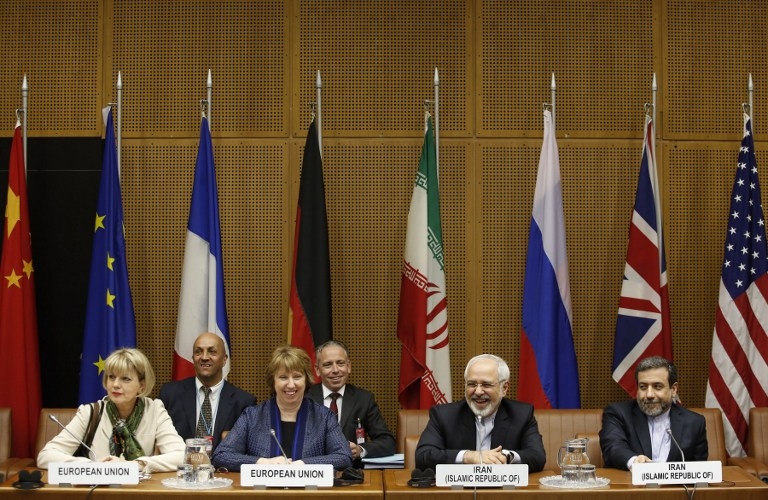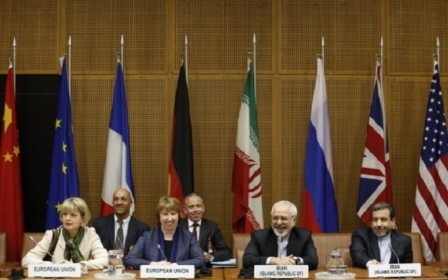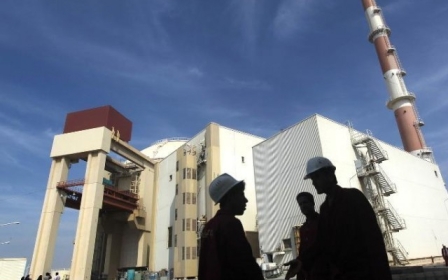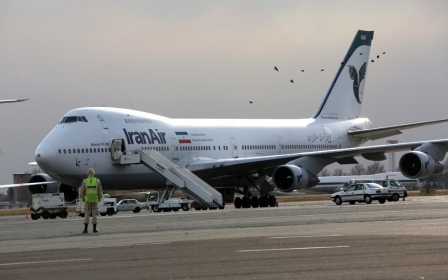US bishops: Iran talks should weigh fatwas on nuclear arms
Iran official says sanctions must be lifted before nuclear deal is concluded

Iranian Foreign Minister Mohammad Javad Zarif during nuclear peace talks in Vienna on 17 June (AFP)
Published date: Vendredi 13 février 2015 - 03:30
|
Last update: 9 années 9 mois ago
Less than a month before a deadline to reach a nuclear deal with Iran, US Catholic bishops are urging negotiators not to underestimate the power of fatwas by Islamic leaders banning atomic weapons.
In a ground-breaking visit, a six-strong delegation from the US Conference of Catholic Bishops (USCCB) travelled in April to the holy city of Qom to meet with top Shiite leaders in a bid to bridge gaps between Iran and the West.
"Iranians feel profoundly misunderstood by America and the West," said Bishop Richard Pates, the chairman of the USCCB's committee on international justice and peace, speaking publicly about the trip on Wednesday.
As the West seeks to negotiate a deal by 24 November to rein in Iran’s suspect nuclear program, the USCCB delegation argued Washington, in particular, should pay more heed to Iranian assertions that stockpiling and using nuclear weapons would be against the fundamental principles of Shiite Islam.
Iranian leaders say Supreme Leader Ayatollah Ali Khamenei issued a fatwa against nuclear weapons in 2003 and has reiterated it several times since.
No text of the fatwa appears to have been written down, but the Iranian religious leaders told the bishops' delegation that it was "a matter of public record and was highly respected among Shiite scholars and Iranians generally," Pates said.
In their talks, the Iranian leaders assured the delegation that nuclear weapons "are immoral because of their indiscriminate nature and their powerful force of destroying all types of innocent communities," Pates told the Carnegie Endowment for International Peace.
Modern culture
"I would argue that we ignore the influence of religion as a motivator and validator at our own peril," said Stephen Colecchi, a leading USCCB official.
He said he believed the US State Department was not seriously factoring in Iranian religious objections to weapons of mass destruction as part of the negotiations.
"Iran is a very, very religious culture. It is also a very modern culture. And it is not all like the caricature of the fanatic religion that we see depicted too often ... and the fatwa needs to be looked at in that light."
In the ongoing nuclear negotiations, the fatwa "does not have every relevance, but it does have some relevance," Colecchi argued, saying it was "pervasively taught and defended in Iran."
"And the possibility of changing the fatwa overnight is non-existent. This is what should be taken into account by diplomats ... it would undermine the whole teaching authority of their system."
"It's inconceivable to a Catholic that the pope would do it like that, and it's inconceivable to them that an ayatollah or a supreme leader would do that," Colecchi added.
University of Maryland academic and expert Ebrahim Mohseni said a recent study found that some 65 percent of Iranians believed producing nuclear weapons was against Islam.
'Sanctions first'
Iran wants all Western sanctions to be lifted before striking a deal on its contested nuclear programme, a top official said Wednesday.
The chairman of the Iranian parliament's National Security and Foreign Policy Commission Alaeddin Boroujerdi said the US proposal of a gradual lifting of sanctions was "unacceptable."
"If we want a definitive accord on November 24, there must be an immediate lifting of sanctions," he told a news conference in Paris.
Tehran has repeatedly denied that it is seeking to develop the atomic bomb, saying its nuclear program is for civilian energy purposes only.
But the West, and the P5+1 remain deeply sceptical, arguing that the Islamic republic must take "verifiable actions" to show the world that its program is for peaceful purposes only.
The six powers in talks with Iran - Britain, China, France, Russia, the United States plus Germany known as the P5+1 – have aimed to close avenues towards Tehran ever developing an atomic bomb, by cutting back its enrichment programme, shutting down suspect facilities and imposing tough international inspections.
In return, the global community would suspend and then gradually lift crippling economic sanctions imposed on the Islamic republic.
A Western diplomat close to the negotiations with Iran on Monday said a firm deal by the deadline was highly unlikely, saying Tehran would have to make "significant gestures."
So far no date has been set for the next round of high-level talks.
US Secretary of State John Kerry has meanwhile hosted a dinner late Wednesday for EU foreign policy chief Cathy Ashton, who is stepping down after leading the negotiations with Iran as part of the P5+1 group, to thank her for "her leadership," State Department spokeswoman Jen Psaki said.
"It’s not a working dinner, but certainly we wouldn’t be surprised if Iran was discussed."
Middle East Eye propose une couverture et une analyse indépendantes et incomparables du Moyen-Orient, de l’Afrique du Nord et d’autres régions du monde. Pour en savoir plus sur la reprise de ce contenu et les frais qui s’appliquent, veuillez remplir ce formulaire [en anglais]. Pour en savoir plus sur MEE, cliquez ici [en anglais].




